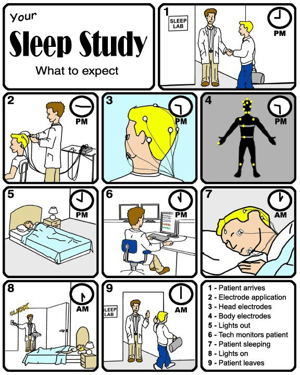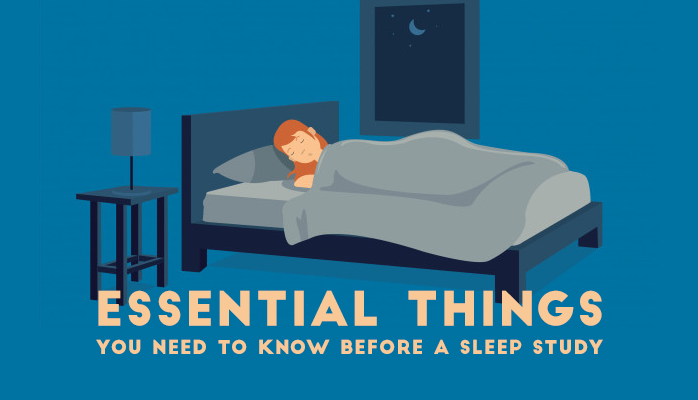Sleep studies are important diagnostic tools for common sleep disorders like sleep apnea, insomnia, circadian and rhythm disorders. Sleep studies have proven to be particularly important in Alaska where the extreme darkness and lightness tend to either cause or worsen sleep disorders.
Sleep studies are non-invasive and painless. They monitor:
- Brainwave activity
- Eye movement
- Muscle movement
- Heart activity
- Breathing
- Blood oxygen level
In a sleep study, you will stay overnight at our facility and have various aspects of your sleep measured. The results will help diagnose a condition or provide more insight on other sleep concerns. Continue reading for essential things to know before a sleep study.
Signs You May Need a Sleep Study
Usually, you may need a sleep evaluation is if you are struggling with sleep or sleep related problems such as:
- Excessive snoring
- Never feeling like you get enough sleep – can’t fall asleep, stay asleep, or wake up too early
- General performance loss in many important areas of life (work, relationships, etc.)
- Chronic daytime fatigue
- Being unable to stay awake during the day
- Sudden onset of sleep-readiness at an odd hour during the day
- Uncharacteristic memory trouble
- Concentration problems
- Chronic brain fog
- Chronic headaches in the morning
- Increased anxiety that is not normal
- Depression
- Uncharacteristic mood troubles
If you notice any of these symptoms, you will need to be evaluated by your primary care physician who can write a referral for a sleep study. However, even if you don't recognize your symptoms as being sleep-related, your physician might from your descriptions, and will refer you to a sleep study without you asking for them to.
Does Insurance Cover Sleep Studies?
While there are many different insurance options, most insurance companies provide coverage for sleep studies. This includes Medicare, Medicaid, Tricare, and healthcare purchased through the Healthcare Marketplace.
Before you sleep study, you can check with us to verify that your insurance covers the costs.
Do You Need a Referral to Get a Sleep Study?
Yes, sleep studies do require a referral. We have patient referral forms available on our website.
How to Prepare for Your Sleep Study
 Preparing to sleep in a strange place, being hooked up to strange monitors can be disconcerting. However, the primary goal of a sleep study is to mimic you daily sleep habits so the results reflect the truth about your sleep. Here are some general tips to help you prepare for your sleep study:
Preparing to sleep in a strange place, being hooked up to strange monitors can be disconcerting. However, the primary goal of a sleep study is to mimic you daily sleep habits so the results reflect the truth about your sleep. Here are some general tips to help you prepare for your sleep study:
- Avoid napping the day of your study
- Avoid alcohol, caffeine, sedatives, and stimulates 24 hours before your study
- Eat regular meals on the day of your study
- On the day of your study, avoid using hair products such as oils and sprays
- Bring comfortable sleep attire
- Bring your regularly scheduled medications
- Make sure we are aware of any disabilities or other accommodations you might have
The idea is to study your sleep as if you were at home.
What to Bring to Your Sleep Study
Your packing list should reflect what you would bring if you were staying the night at a hotel
- Comfy and appropriate sleeping attire
- Any medications you are required to take
- Other things that help you sleep well, such as a favorite pillow
- Any night time related items, such as face wash or toothbrush
- A spare change of clothes (we have showers at our facility)
Other than basics, there is nothing special to bring.
How Long Will Your Sleep Study Last?
Sleep studies are an overnight experience, usually starting in the late evening and ending early morning, around 5:30 am to 6:30 am.
What Will Happen During Your Sleep Study?
During your sleep study, you will be hooked up to monitoring equipment. Fortunately, it’s not very invasive and most people do not have trouble with it as this equipment can be adjusted.
You will have a bathroom available and a private room. If you need to use the bathroom sleep specialists can assist you in removing and reapplying the monitoring equipment.
As you sleep, there is a lot of information collected about your sleeping.
During a sleep study, you don’t have to do anything special except for sleep. To review, the basic process is:
- Arrive at the facility in the late evening
- Prepare for sleep and lie down in a private room
- Get connected to monitoring devices, adjusting them as needed
- Be monitored by sleep specialists while sleeping
- In the morning when you wake up you can shower and have a light, complimentary breakfast at our facility
What Happens After Your Sleep Study
After your sleep study, our Medical Director will review your results and them forward the final report to your doctor, usually in 2-5 business days, who will call you with the results.
If you or someone you know is struggling with their sleep health, then please click the orange button below to take a free online sleep test and talk with one of our sleep health professionals.


